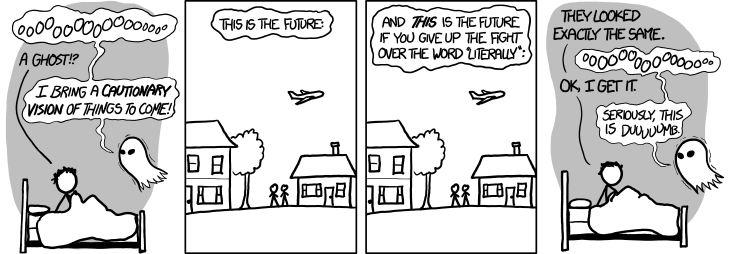"First of all," began the priest on the other side of the grille, "you're not gay."
I knew what he meant (and he went on to say it): that no one is reducible to their sexual orientation. Not that he would have been fond of the phrase sexual orientation. Still the way he put it just wasn't helpful. I'd had the lecture before, so I wasn't shocked, but I was -- well, bored.
Until recently, most of the language about language that I'd come across on the subject, from Catholics anyway, was about how no one should identify as gay, or even use the word, or even think the word, or even be caught dead in a field with someone who had once thought the word.
"Then I spoke the Deplorable Word. A moment later I was the only living thing beneath the sun."
Speaking of oneself as straight, however, seemed to get a pass, at least until just recently. Marc Barnes, author of the Bad Catholic blog on Patheos, wrote a post last year in which he attacked the very idea of heterosexuality:
Heterosexuality, understood as a sexual attraction for the opposite sex (as an attraction for women or men in general) makes the object of my attraction unreal. Woman as such does not exist ... In reality, there are only particular women, just as there are only particular men, and every instance of sexual attraction is attraction to a particular person. ... The idea of an attraction to "women in general" trades the particular person for the thought-construct of "women in general" ... This is not to say that it is impossible to be attracted to the opposite sex as such. We may be, and in varying degrees. Indeed, I would argue that attraction to the opposite sex as such is the very modus operandi of pornography, which works to reduce a person to their sexual attributes. No, this is to say that to be attracted to the opposite sex as such is inadequate, immature and perverse.*
It's refreshing to encounter someone being so consistent; and he deserves credit, too, for pointing out the ways in which a heteronormative approach to Christian morals has a tendency to falsely exempt straight people from blame -- a little further on, he remarks, "I have experienced the particularly odd phenomenon that Christian men who watch pornography find some justification in watching heterosexual pornography, as if to say 'my attraction to a pixelated reduction of a person is more normal than your gay attraction to a pixelated reduction of a human person.'" Michael W. Hannon wrote a column for First Things last month in which he advanced a similar argument, calling for the total dismantling of the idea of sexual orientation, and that Christians should ally ourselves in this respect to the elite among queer theorists like Michel Foucault, who have long considered all sexual orientations nothing more than mental constructs. Similarly, at Crisis Magazine, Deacon Jim Russell has criticized the inadequacy of sexual orientation as divided from loving a particular person.
There are definitely problems with the straight-gay essentialist dichotomy, whether espoused as an attack on traditional morals or as a defense of them. In my experience, people on all sides see the limitations of it: on becoming a Catholic in college, I found among fellow Catholics a great dislike for reducing people to nothing but their sexual orientation; in fact, they disliked such reductionism almost as much as the lesbians and gay men I'd known in the Pride Alliance disliked such reductionism. And the ranking of people that such thinking can lead to, as though there were some intrinsic inferiority -- rather than plain hard luck -- in being gay, is unchristian and a little bit silly. After all, there is no command in Scripture, "Thou shalt be heterosexual"; and I've yet to hear anybody claim that being straight was their own clever idea.**
However, I think the sort of dismantling that Barnes et al. have proposed is kind of impractical, and that it too lightly dismisses the reason that such language was created in the first place. For instance, both seem to claim that the very existence of the words, and their use, springs from and necessarily involves an essentialist understanding of sexual orientation. Hannon in particular goes further, saying that such ideas were totally foreign to (and implies that they would certainly have been rejected by) our ancestors.
I'm not so sure of any of these claims. It's true that modern ideas of sexual orientation didn't exist until the nineteenth century; but that does not bind all ideas that involve the concept of sexual orientation to the same network of theories in which the concept first arose. Psychotherapy does not require Freudian premises in order to exist, just because Freud was a dominant pioneer of psychotherapy.
And after all, while our ancestors might have been readier than much of contemporary culture to concede that nearly anybody might dabble in same-sex activity, they would surely have recognized that there were still general tendencies and tastes among human beings, about sexuality as much as about anything else -- whether they bothered to name them or not. (Dante's treatment of the penance of the Lustful in Purgatorio XXVI certainly suggests that such a recognition was there, in his own time and place at the least.) I don't think it either wrong or useless to have a word for such tastes, and heterosexual and homosexual will do as well as any other. They have, too, the advantage of already being common currency.
I also feel that the perspective these authors have set forth is a little too hard on heterosexuality. Yes, mere attraction to the opposite sex is inadequate as a basis for sexual ethics. Now, it does carry with it the advantages of normalcy, in the sense that most people are in fact attracted to the opposite sex, so that most of what people say about it will (probably) make sense to you without any weird conversion factors -- applying sexual teachings aimed at a predominantly straight audience to a queer experience can feel kind of like converting between Farenheit and Celsius in your head -- and you don't (probably) have to endure the trial of feeling like a freak, or at least not because of your sexual orientation. But that of course does not make heterosexuals better than other people.
Picture offered without comment.
Nonetheless, I think it is going too far and risking too much misunderstanding to refer to heterosexuality as a perversion. It's true that merely being "attracted to women" is, so to speak, an incomplete experience: a man cannot form a relationship with "women" in general, not even the most ardent polygamist. And it is only in the context of relationship that sexuality becomes fully human, by the integration of the animal and the spiritual elements of human nature.
All the same, the simple fact that he has a general disposition to be attracted to the opposite sex, and that this disposition should manifest itself outside the existence of a specifically marital relationship -- to put it bluntly, the fact that a dude can and will get horny whether he's married or not -- is not in itself perverse. It's part of the animal element of us, and manifests itself quite apart from our voluntary choice (as men who are or have been teenagers can readily attest). This needs to be taken up into the virtue of chastity, whether by disciplining and sublimating it for a celibate renunciation of sexual pleasure, or by disciplining and sacramentalizing it for the passion of the marriage bed; but the fact that it exists beforehand in an undisciplined state isn't immoral. It's part of the raw material of the human person: that it is precisely raw rather than finished material doesn't make it bad, just incomplete.
Of course, indulging it in its raw state is bad, and (here I join with Barnes particularly) there are those -- especially in entertainment and porn -- who have it in their economic interest to train us to look no further, and even to actively resist the full humanization of our sexuality: to think of sex primarily in terms of a pleasure, a thing, rather than as a uniquely pleasurable (and, in a way, mystical) mode of relating to a particular person. But we all know what they say about the oldest profession. Objectification and the chattelizing of human persons for sexual pleasure have been around since the fall of man; the invention of the categories of sexual orientation can't be blamed for that.
I am, as many of my enemies and friends alike will probably tell you, a bit of a drama queen. But for once, I actually think the solution here is to chill out. People experience the world in this or that way, and that's fine. Probably the idea of sexual orientation does have an expiration date; and that's quite irrelevant to Catholic theology, which concerns itself with actions rather than with dispositions when discussing right and wrong.*** But as long as it is around, I don't think we need to bother to deconstruct it. We may; it isn't sacrosanct. Yet while it is around it has its uses, not least in providing us with convenient terms to sum up individual persons' experiences of sexuality. And insofar as sexuality is, as the above authors have all insisted, personal, I think the usefulness of such terms outweighs their artificiality.
But then the Ghost of Subjunctive Past showed up and told me to stay strong on 'if it were.' ****
*Personally I find the omission of the Oxford comma more perverse than any amount of heterosexuality (little taste though I have for the latter), but if I were to divert myself into linguistic and orthographical channels now, the flood would never be dammed.
**I am not here addressing the ex-gay movement, whose claims about orientation are slightly different. I am highly distrustful of those claims, for a number of reasons that I have outlined before; but it's a separate conversation.
***This isn't to say that considering individual moral cases in their individuality (what is technically called casuistry) is unimportant, or that a person's motives aren't relevant to morality -- of course they are. It is to say that the general tenor of a person's desires, while they are important to a person's own individual spiritual state, don't effect the intrinsic rightness or wrongness of an action, whether in sexuality or elsewhere. Or, to grossly oversimplify, wanting or not wanting something isn't what makes it okay or not okay.




Barnes is clever, and maybe right, in saying that an attraction to the opposite sex is perverse but I'd suggest that speaking of an attraction to the opposite sex is usually just an imprecise way of saying attracted to persons of the opposite sex. Similarly, if one says one is attracted to women in general, it usually means that one finds individual women attractive.
ReplyDelete